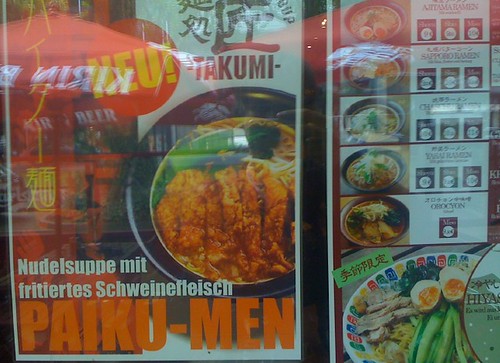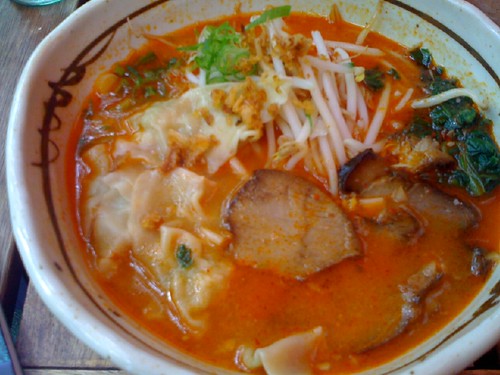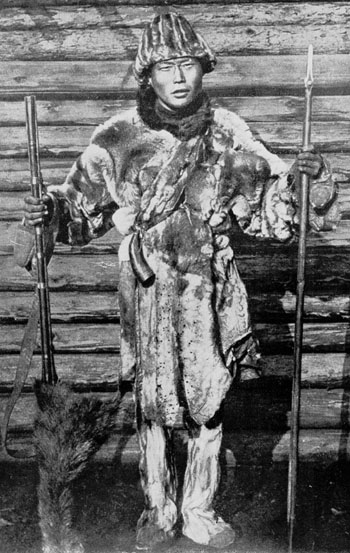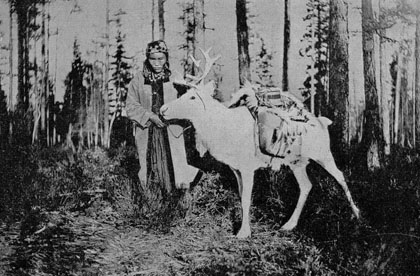Birthday bravery, Japan envy, swamp reindeer and soggy schnitzel.
Sunday, 3 August 2008 by kinakoJam

Spotted in Dusseldorf this afternoon (at Takumi
ramen shop): Paikumen. Fried breaded pork cutlet on top of ramen soup? That has got to be good. And surely the Germans are gonna love that schnitzel-with-a-twist.
"Surprise..... it's soggy!"
We spent last night in Dusseldorf because it was my birthday. Since we stayed over, we were able to fit in 2 & 1/2 eating opportunities.
So we munched through:
- matcha-white-chocolate mousse
-black vinegar sour cocktail
-cha-shu kimchi salad
-goya champuru with pig's ears
- small Iberico spare ribs cooked on the yakitori grill and served with lemon and baby wipes
- yaki-onigiri
- sasami salad with renkon chips
-pork bibimba with nori flakes and rocket/rucola/arugula.
- ramen
Who let the pigs outs, huh?
We also bought some more Japanese cookbooks (including one with Japanese renditions of healthy indian food, and one with Japanese interpretations of Vietnamese and Korean dishes), Japanese/Korean groceries (just some rice, shiso, kimchi etc), went disco dancing, and went to an exhibition.
It's nice to have a feeling of being somewhere different - just a 25 minute train ride from Cologne. Germany in general does not have so many big enclaves of other nationalities, except Turkish. The Turkish street in Mulheim is our other nearby option for a quick and cheap 'escape from Germany'.
My lunch today was the Orochon Ramen (see below).

This was really delicious.
I tried to look up 'orochon': apparently it is the name of a Northern Manchurian swamp-dwelling people who live entirely off reindeer.
"The greater part of northern and central Siberia is swamp taiga. The largest marshy area in the world, it stretches for hundreds of miles and consists of stagnant lakes and boggy pools of glistening green water interspersed with myriad tufts of grass. The whole culture of the Orochi, everything they own or do, stems from or refers to the reindeer."
(Lissner - Man, God and Magic)


One website claims that 'orochon' is also Ainu (native Hokkaido people) for 'bravery'. A little more digging reveals that there is a 'fire festival' called Orochon, in a town called Abashiri, famous for its prison that housed Meji-era political prisoners. The Orochon fire festival consists of a memorial service and fertility rituals that commemorate the Moyoros (predecessors) of the Ainu people.
I'm still not sure what the connection between Manchurian swamp-dwellers, the Ainu people and chilli ramen is.
In any case, the ramen wasn't so spicy it required bravery. Nicely hot and swimming in beautiful orange oil, topped with some hand made prawn wontons. Could be good combined with soggy schnitzel too.
Now...........................Does anyone know where the word 'paiku' comes from?

This comment has been removed by the author.
I am a bit dubious with the alphabet spelling "paiku", but since it's in the noodle context, I think it's the Chinese-origin 排骨, which is pork ribs, and 排骨麺 is pork ribs served on top of noodle soup, or sometimes noodle without soup. The pronunciation in Japanese is more like "paiko", and is fairly popular in Japanese Chinese restaurants.
You can also see an example here
http://eat.tanspace.com/2008/03/24/paiku-%E6%8E%92%E9%AA%A8-pork-ribs-ramen-at-ajisen-ramen/
paikomen huh? pork ribs on soup sounds yummy.
a whole new horizon of ramen toppings is opening up for me.
just like the day i discovered that curry can be eaten with sausages and cheese.
things will never be the same!